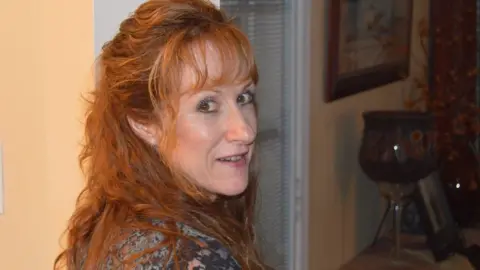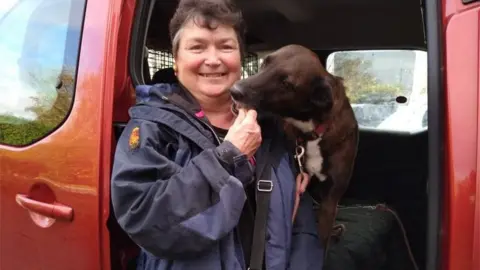Self-employed: 'I swing between anger, hope and despair'
 Helen Godbold-Eade
Helen Godbold-EadeMonths of worry and sleepless nights has taken its toll on Helen Godbold-Eade. "I swing between anger and depression, hope and despair," she said. "And exhaustion, always exhaustion."
Like millions of the UK's self-employed and owners of small businesses, she suffered a dramatic coronavirus hit to trading. But what has made things so much worse, she says, is not being able to access vital support.
On Monday, Chancellor Rishi Sunak announced that from Thursday the self-employed would get enhanced help for the month of November - 80% of their trading profits instead of 40%.
Not Helen, though. In fact, she is one of an estimated 2.9 million self-employed and freelancers who have never been entitled to the job support package put in place when lockdown was imposed in March.
The injustice, she says, is corrosive. "It's really hard to stay positive when you have so much fear about having enough to live on."
There are several reasons some self-employed cannot access the relief. For some it's because they are newly-self employed and do not have the necessary financial track record. For others, it's because they earned too much in recent years to qualify.
But Helen is disqualified from the Self-Employment Income Support Scheme (SEISS) because her property administration company, Like-Clockwork, pays her in dividends - a perfectly legal method used by tens of thousands of directors.
"I pay £48 less tax per year than my sole-trader colleagues. I take £12,000 a year via PAYE, and between £10,000 and £12,000 a year via dividends - but only if I've made enough profit. That's why I do this model.
"The government has said those paid in dividends can't claim any support as they can't tell whether the dividend has come from my business or from investments. Utter tosh. It's on my company accounts and my tax returns."
Savings gone
Working from home means other grants and rates relief are not applicable, and she does not want to risk taking on debt via a Bounce Back Loan because the future of her 15-year-old business looks so uncertain.
She said: "Turnover has halved due to Covid 19, and there's no way of knowing what will happen in the coming months. The stress and worry has been really hard to live with. It's with me 24/7. Sleepless nights are the norm."
Helen says she has exhausted her savings, and relentless job-hunting has so far failed to turn up any work. "But I'm trying to stay positive and support others who are going through worse," she said.
 Huw Davies
Huw DaviesPeople in a similar position say support groups, such as ExcludedUK, which campaigns on behalf of the left-behind, have been vital in getting them through the last six months.
"We're all part of the same sinking ship, but ExcludedUK has been a lifesaver," said Huw Davies.
Aged 60, he had one eye on a comfortable retirement. Now, with work having dried up and his savings slowly eroding, the IT project manager can only see his financial desperation getting worse.
"If nothing improves, in a few months I'll have to put the company into bankruptcy and move back into my mother's house," he said. "I'm just so very anxious about my future. It looks bad."
Huw said he doesn't qualify for self-employed support because of an "arbitrary" tax deadline. He paid his tax bill on 4 April, but to qualify the Treasury wanted tax paid in March, he said. "They have got seven years' worth of proof about my tax and earnings, but that's not enough.
"I'm too old to get another job; I must have applied for 70-80. I'm surviving on my retirement savings and money that I put aside to pay a tax bill next April."
He gets Universal Credit but says it's not enough to cover the rent. A divorcee, he used to help out his three grown up children financially, but now doesn't even have enough spare cash for a night out.
 Julie Headley
Julie HeadleyLike Huw, Julie Headley has survived by eating into personal savings and money set aside for next year's tax bill. She has taken out a £19,000 bounce back loan, but it doesn't come close to meeting her outgoings.
She doesn't qualify for self-employed support because profits for the last three years at her dog day care and boarding business, Coventry-based Out of the Dog House, have been "just over" the £50,000 cut-off.
'Ruin and poverty'
"During the first lockdown, business just ceased. No income. People were either working from home or furloughed, so didn't need our services," she said.
To survive, she cancelled some insurances, took a vehicle off the road, and cut back on purchases. She knows many other people face hardship, but feels her plight is made worse by a seemingly arbitrary rule.
"Why the cut-off of £50,000 for the self-employed? There was no cut-off for PAYE, just a cap on the grant allowed. It's so unfair," she said.
"I keep hearing the chancellor say he's increased support. Yes, but he's not changed the criteria for who can get that support. It's a mess, a shambles."
The end result will be the collapse of otherwise profitable companies, Julie said. "That will mean more expense for the government in benefit payments, a loss of tax revenue, and fewer people able to repay the bounce-back loans.
"And all this is in addition to the stress caused for business owners and their families, and the prospect of ruin and poverty."
The Treasury declined to comment specifically on those excluded from SEISS support, but pointed the BBC to a Commons statement on Tuesday by the Chief Secretary, Stephen Barclay.
He acknowledged that some people are not covered, calling the issue an "area of much debate". However, he added, the government has "offered over £30bn of support to the self-employed, which is generous by international standards".

- LOCKDOWN LOOK-UP: The rules in your area
- SOCIAL DISTANCING: How have rules on meeting friends changed?
- SUPPORT BUBBLES: What are they and who can be in yours?
- FACE MASKS: When do I need to wear one?
- TESTING: How do I get a virus test?

